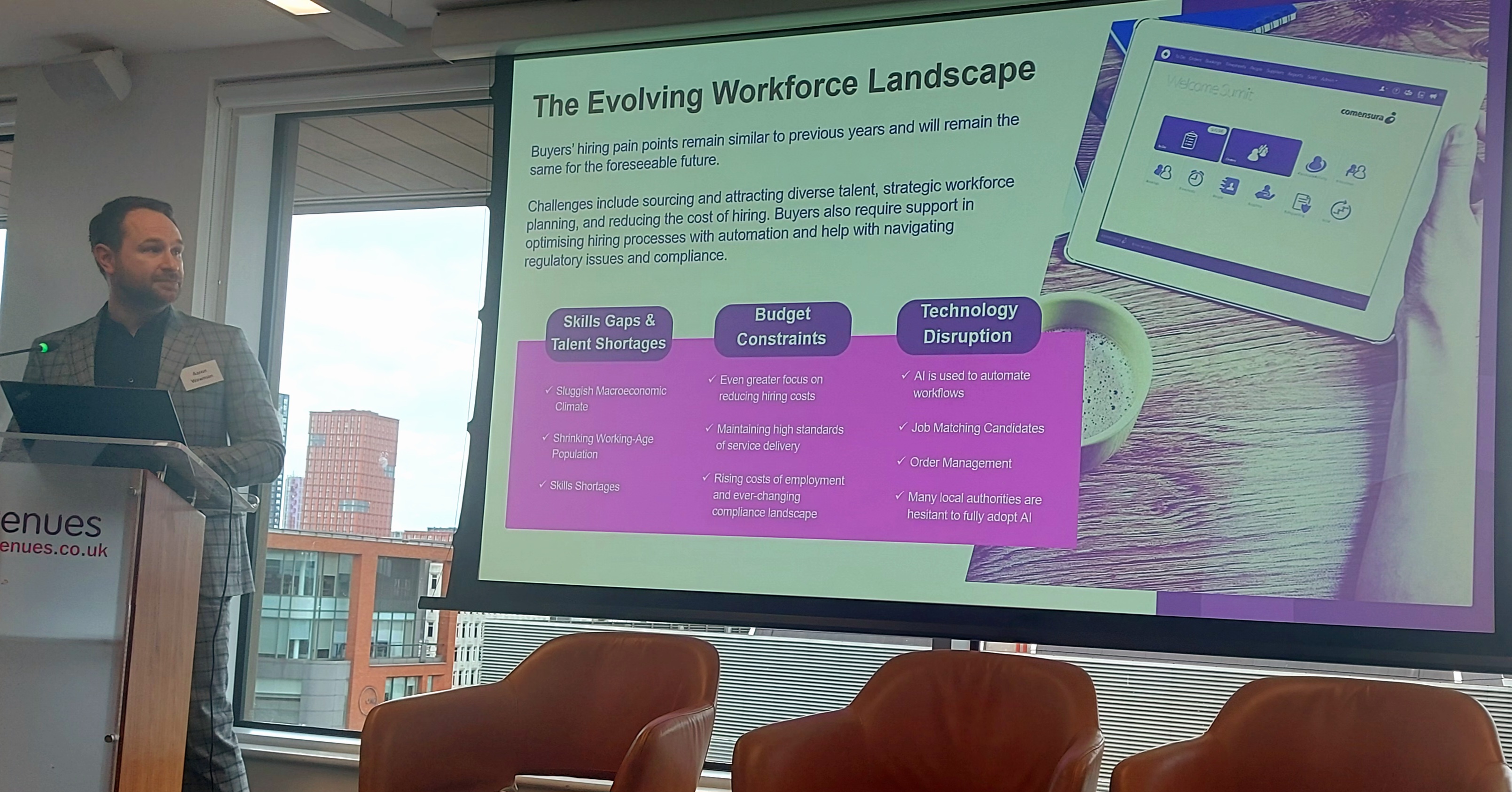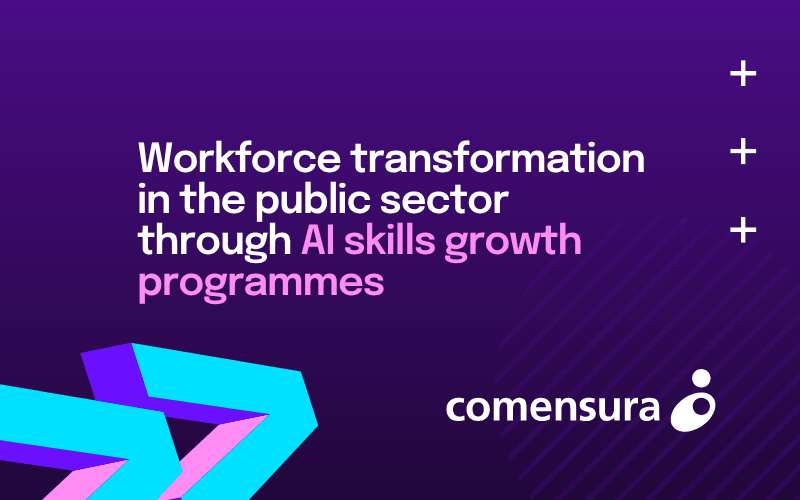

Author
2024-09-30
4 minutes
Navigating the challenges and opportunities in local authorities: Insights from the 2024 Local Authority Foresight Summit
In recent months, local authorities have faced many challenges that have significantly impacted operations and service delivery. From severe staffing shortages to impending legislative changes to a new government, the public sector is navigating a complex landscape that demands strategic foresight and agility.
The Local Authority Foresight Summit 2024 in Manchester invited local authority procurement and HR leaders to delve into the latest insight and updates affecting local government entities, from experts across the talent, workforce and procurement landscapes.
The event was a big success with passionate panels, plenty of questions and conversation filled roundtables. Here are some of the key takeaways:
New research reveals scale of local authority staffing crisis
Hoa Ngo, Managing Director at Comensura shared key findings from the latest local authority talent insight research report, based on survey responses from 60+ local government execs, procurement and HR leaders. Some of the most pressing statistics quoted were:
- The research reveals local authorities are struggling in the face of staffing crises
- 83% of local authorities stated that talent shortages are having a mid or high-level impact on their authority's performance
- Surprisingly finance and legal skills are the joint leading skills shortage for local authorities, in addition to health and social care
- Only 9% of respondents felt the government was supportive of skills development in social care, with 53% describing social care provision as ‘pressurised’ or ‘under extreme pressure’
With existing skills shortages in a wide range of areas relevant to local authorities, public sector leaders must strategise on how to attract new talent to the public sector and keep the talent they currently risk losing. You can download a copy of the paper to find out more.
Procurement Act – last minute delay causes uncertainty but opportunity
Michelle Walker, Head of Procurement Services at YPO lead discussions on what this means both in the long and short term. For now, the delay to the Procurement Act 2024 from October 2024 to February 2025 means that local authorities and other public sector bodies will need to continue operating under the existing procurement regulations for a longer period.
Gillian Askew, Director at Go4Growth shared that this postponement is expected to give organisations more time to prepare for the new requirements and ensure that they are not rushed into compliance. It also allows time for the new government to carry out additional consultation and refinement of the guidelines to fit in with their strategic ‘mission led’ goals and promise of more support for small to medium sized businesses.
Nichola Cooke, Assistant Director at STAR Procurement verbalised what many where no doubt thinking: This digital platform will only make a positive difference if it is both fit for purpose and user friendly. It was widely agreed that the delay might give the opportunity for those making the changes to ensure that is the case, but still apprehension that there might still be teething problems.
Simon Bullimore, Group Head of Procurement at Norse Group maintained upbeat, stating the key is going to be not letting this delay cause a loss of momentum. The new Procurement Act offers opportunities for innovation, greater use of SME suppliers and those organisations that are open to these changes should maintain enthusiasm and communication as changes unfold over the coming months.
New statutory guidance on use of agency child and family social workers rolled out October 2024
The transition year for the new statutory guidance for local authorities on the use of agency child and family social workers begins 31st October 2024.
The revised agency regulations will offer local authorities precise statutory guidance regarding the employment of agency child and family social workers. This updated framework aims to streamline procedures, ensuring that agency personnel are effectively incorporated into the current workforce, improving service delivery and creating increased stability.
A key aspect of this is to enable local authorities to standardise pay rates across authorities, sharing data to agree on regional pay caps on rates.
Additionally, a commitment to refrain from hiring early career practitioners, or staff who have recently left permanent roles in the same region, as agency workers and ensure they directly manage all staff hired through so-called project teams.
Richard Hayward, Head of Social Worker Strategy, Retention and Agency, explained the rationale behind the move: Social Workers switching to agency work or moving between local authorities for financial reasons are negatively impacting social work provision both in terms of finances, but also in terms of continuity of care.
These steps will prevent authorities from competing with each other for workers with wages as a ‘weapon’ and avoid levels of social workers from moving to agency work for immediate pay increases.
In addition, the growing importance of social value considerations, such as social mobility, diversity, and environmental impact, will be emphasised. This shift not only aligns with ethical practices but also broadens the talent pool, fostering a more inclusive and sustainable recruitment process.
In six months' time, those involved in the creation of this new guidance are set to take stock of how the roll out has gone, and what changes need to be made, if any.
The countdown begins for the new Employment Rights Bill
The new Employment Rights Biil – announced in the King’s speech following the election of the new government - is set to be the primary legislation in Labour’s ‘Make Work Pay’ initiative.
The full details are set to be announced mid-October. These reforms will influence various facets of employment within the public sector with key areas including zero-hour contracts, worker classification, union rights, and day one rights. Health and social care is a key area that will be significantly impacted.
Tania Bowers, Global Policy Director at APSCo was driven in her message that public sector organisations must proactively prepare for these changes. Embracing the principles of social value will further strengthen the public sector's commitment to ethical employment practices, ultimately benefiting both workers and the wider community that they serve.
Career paths to the public sector diversify as candidate priorities change
Local authorities should embrace alternative career approaches such as apprenticeships and the recruit, train, deploy model. Apprenticeships provide a structured pathway for individuals to gain practical experience and qualifications, while the recruit, train, deploy model ensures that employees are continually developing their skills in alignment with the evolving demands of public service.
Chris Blackburn, Head of CSR at Impellam Group explained how this is a win-win situation for everyone involved. In both instances not only do you get workers in situ in a shorter timeframe, but you attract a wider range of candidates, promoting diversity and social mobility. He had many real-world examples to share of people from disadvantaged backgrounds finding rewarding careers they hadn’t thought they could, through these alternative routes.
Additionally, by investing in these approaches, local authorities not only enhance the quality of public services but this commitment to workforce development is crucial in adapting to future challenges and opportunities, ensuring that they can deliver exceptional service to their constituents.
Social value becomes a ‘must have’ not ‘nice to have’
Social value has become essential within the public sector due to a combination of evolving societal expectations, legislative changes, and government strategy.
As public awareness and concern rises in social issues such as inequality, sustainability, and community well-being, public sector organisations need to demonstrate their commitment to ethical and responsible practices.
In talent procurement, key aspects of this are increasing diversity and social mobility. At our event we look at a multitude of ways that this can be done, including:
- Thinking outside the box to find underrepresented groups that would value an opportunity in the public sector and using new sources of talent, such as former prisoners, refugees, and care leavers.
- Getting involved in the education system in deprived areas, motivating young people to look beyond what they see in their immediate circumstances and what careers they might want to explore with the right access to experience.
- Giving those considering working in or looking to develop in the public sector role models they can relate to and approach.
- Establishing local authorities as employers of choice for people that want to make a difference and positively contribute to the world they live in.
Duncan O'Leary, CEO @ New Futures Network works with prisons to create the infrastructure that will enable more prison leavers to secure employment, and described how much of a difference this can make for both prison leavers and their employers.
Employers have found incredibly loyal team members who have stayed on to develop and grow within the company, whilst prison leavers have been able to forge a life beyond their time in prison. This has also enabled them to be reunited with family, and in some instances become a positive role model for their children.
Aaron Wawman, Sales Director at Comensura stated that hiring pain points remain similar to previous years and will remain the same for the foreseeable future.
Challenges include sourcing and attracting diverse talent, strategic workforce planning, and reducing the cost of hiring. Buyers also require support in optimising hiring processes with automation and help with navigating regulatory issues and compliance.
There are some key strategies to overcome these challenges, and he gave a four-step plan he’d suggest:
- Strategic Workforce Planning: Data-driven strategic workforce planning allows you to forecast talent needs more accurately and address skills gaps proactively.
- Embrace Multi-Channel Talent Sourcing: Local authorities need to take a holistic approach to sourcing talent by tapping into multiple channels
- Leverage Technology and Automation: By adopting AI-powered tools, local authorities can streamline processes and reduce administrative burdens.
- Adopt Flexible Pricing and SOW Models: A key trend is the increased reliance on Statement of Work (SOW) services, which now account for 37% of total MSP spend
Direct Sourcing was a solution mentioned that combined many of these strategies, with research also showing that greater cost savings and better candidate quality were leading advantages of this as an approach.
Find out more
For more information on events and resources for procurement and HR leaders in local authorities, follow us on LinkedIn or contact us.
Insights to drive workforce performance
Workforce insights in your inbox
Sign up for our newsletter with the latest workforce management news, insights, analysis and more.
United Kingdom
First Floor, Mulberry House
Parkland Square
750 Capability Green
Luton, LU1 3LU
Australia
Suite 1403
Level 14, 309 Kent Street
Sydney
NSW 2000















